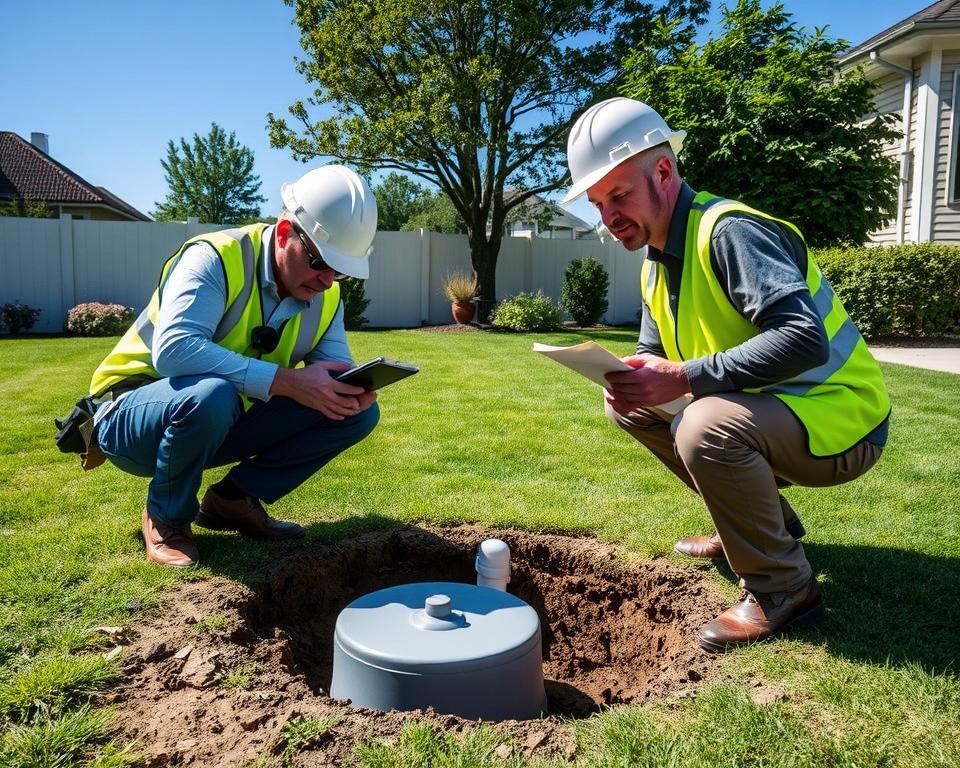Vital Guidelines for Septic System Pumping
Do you ever think about how often you should arrange septic system pumping so you can dodge costly breakdowns? With over 20 percent of U.S. households relying on septic systems, comprehending their maintenance is crucial. Having a clear idea of when to book a septic tank service is critical to its durability. In addition, homeowners have access to economical septic pumping options that provide excellent functionality while staying on budget. This guide covers critical upkeep tips useful for every homeowner.
Core Findings
- Routine septic system pumping is crucial for efficient performance.
- Identifying the symptoms that suggest the requirement for service can ward off major issues.
- Selecting licensed septic system pumpers guarantees quality maintenance.
- Budget-friendly septic pumping choices are available for homeowners.
- Periodic inspections support maximum system performance.
Learning About Your Septic System
A septic system plays a key role in handling household wastewater, made up of several integral components that work collectively. The initial drain line carries wastewater from your home to the septic tank, where the process begins. In the tank, an underground chamber, solids settle at the bottom, and bacteria digest these solids, processing the waste effectively.
The clarified liquid outflow next travels from the septic tank to the distribution box, where it is spread evenly across the drain field or leach field. Here, the soil continues the filtration, further purify the wastewater. Understanding the functions of these septic system parts is critical. It allows homeowners to monitor and upkeep their systems efficiently.
Being aware of how your septic system functions helps you implement preemptive maintenance measures. It’s beneficial to have scheduled meetings with licensed service providers of septic systems – 24 hour septic tank pumping near me. They supply crucial insights for best functioning of your system. These experts assist in scheduling the essential pump-outs and checks. This proactive approach can significantly lengthen your septic system’s lifespan.
Why Septic System Maintenance Matters
Maintaining your septic tank consistently is pivotal for homeowners who want their system to endure. A well-cared-for system provides peace of mind and protects your property’s value. Without appropriate care, you’re exposing yourself to system breakdowns and health dangers.
Selecting a top-notch septic pumping service is crucial. They deliver timely inspections and pump-outs, clearing out sludge and scum buildup. If maintenance is overlooked, emergency pumping may be required, which is expensive.
Following a regular maintenance plan is prudent. It includes professional evaluations and regular pumping. This proactive measure heads off urgent issues, ensuring a healthier living environment for everyone.

Warning Signs for Septic Systems
Staying mindful of septic system issues can prevent expensive repairs and major damage. Key signs signal when your system demands a check. These consist of:
- Delayed drains throughout the house
- Pooling water in the yard above the drain field
- Bad odors near the septic tank or leach field
- Exceptionally thick grass growth in specific areas of your yard
These signs could indicate problems that might result in your system failing. Prompt action is critical. Calling in septic pumping specialists for an inspection aids. Prompt response avoids initial issues from becoming large ones. Moreover, consistent upkeep guarantees your system runs well and has a longer life.
Best Practices for Septic System Pumping
Correct pumping of your septic tank is crucial to prevent expensive clogs and backups. It’s vital to establish the appropriate schedule for maintenance. Homeowners should generally schedule pumping every 2 to 5 years, depending on the tank’s size and household wastewater levels. Heavy use of garbage disposals may demand more frequent pumping.
Using experienced pumpers ensures your tank gets a full clean and check-up. During pumping, technicians look for any issues, such as broken baffles. Spotting these problems promptly avoids larger expenses and inconveniences later. Regular pumping schedules and expert help ensure your septic system’s efficient operation.
Regular Inspections Keep Your Septic System Running
Regular inspections are crucial for your septic system’s effectiveness. Septic system inspections reveal small issues before they worsen. Professionals advise inspections every three to five years, influenced by system size and household usage. This avoids pricey fixes.
Maintaining maintenance records is vital for monitoring your system’s condition. These records give insights into previous inspections, repairs, and when to schedule septic tank cleaning services. With this information, planning for future upkeep becomes simpler, keeping septic systems in prime shape.
Regular inspections and detailed record-keeping not only improve system efficiency but also lengthen its life. This approach secures the environment and the investment in a safe, operational home.
| Inspection Type | Recommendation Frequency | Benefits |
|---|---|---|
| Visual Inspection | Annually | Identify surface issues |
| Professional Inspection | Every 3–5 years | Assess functionality and detect problems |
| Septic Tank Pumping | Every 3–6 years | Prevent overflow and system failure |
Efficient Water Usage to Extend Septic Life
Mindful water use is crucial for keeping your septic system robust. It not only helps the environment but also boosts the performance of your home’s plumbing. By embracing easy, yet effective, conservation methods, homeowners can decrease wastewater.
Space out your laundry activities over the week instead of running back-to-back loads. This helps the septic system to process water better and prevents tank overflow. Installing low-flow fixtures in your kitchens and bathrooms yields considerable water savings, maintaining the water pressure up while lowering the flow rate, thus lowering the amount of wastewater produced each day.
Swiftly fixing leaks is another practice to support your septic system. Even a small leak can cause a large waste of water, overburdening the septic system. Through periodic inspections and repairs, you contribute significantly to the system’s efficiency.
Focusing on water conservation isn’t just beneficial for your septic system; it’s also a step towards eco-friendly living. Embedding such practices into everyday habits helps both your household and the planet.
Proper Handling of Household Waste
Homeowners play a crucial role in preserving their septic system’s health by disposing of household waste appropriately. It’s critical to avoid throwing away non-biodegradable items like wipes, plastics, and other harmful products in the system. These items can trigger clogs, causing costly repairs and a decrease in efficiency.
Recycling food scraps and organic materials is a advantageous alternative to throwing them in the trash. This practice greatly lowers the amount of solid waste entering the septic tank. Focusing on biodegradable waste disposal helps maintain the ecological balance needed for effective waste management.
It’s important to monitor what goes down the drains. Non-decomposable items can requiredemand more frequent septic tank pumping. By understanding and observing correct waste disposal methods, you can secure a more efficient and long-lasting septic system.
Safe Cleaning Products for Your Septic System
The health of your septic system depends significantly on your choice of cleaning products. Selecting septic-safe cleaning products is crucial. These products shield the balance of beneficial bacteria that digest waste. Many standard cleaners have harmful chemicals that jeopardize this balance, causing expensive repairs or system failure.
Homeowners should try natural alternatives that are both efficient and environmentally friendly. Common household items like baking soda, vinegar, and lemon juice are superb choices. These natural cleaners are not only good at cleaning but also maintain your septic system’s health.
Keeping away from products that contain antibacterial agents and chlorine bleach is crucial. Such substances destroy the beneficial good bacteria, compromising your system’s functionality. By adopting sustainable products, you protect both the efficiency and longevity of your septic system.
Why Bacteria Matter in Septic Systems
Bacteria play a vital role in keeping your septic system healthy. They digest solids organically and enhance nutrient processing. A lack of healthy bacteria can trigger system failure, resulting in expensive repairs.
Homeowners can improve their system by using organic additives. These products boost beneficial bacteria, making waste decomposition more effective. It’s important to opt for organic additives that are helpful, not harmful, to the septic environment.
A robust bacterial community is essential to a septic system’s longevity and efficiency. It stops solid buildup and lessens the need for regular pumping. Emphasizing bacterial health creates waste management more effective and eco-friendly.
In Summary
Septic system care is crucial for the durability and functionality of your home’s wastewater system. Following critical maintenance tips prevents expensive repairs. Knowing routine pumping and inspections is key. This secures your septic system keeps in excellent condition.
Learning about your septic system’s operation and smart approaches in water and waste management is vital. Engaging professionals like All in Sanitation provides expertise. This supports your septic system’s long-term health and provides confidence.
Investing in proper septic maintenance today brings future benefits. It safeguards your home and boosts your family’s quality of life. Prioritizing septic system care gives certainty with a well-maintained system.


